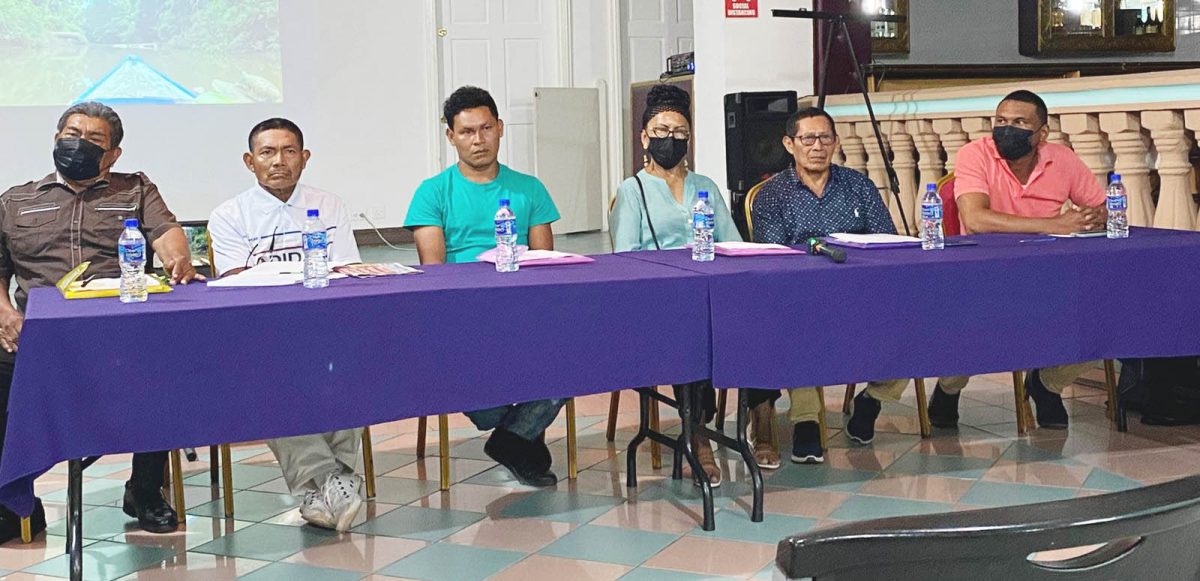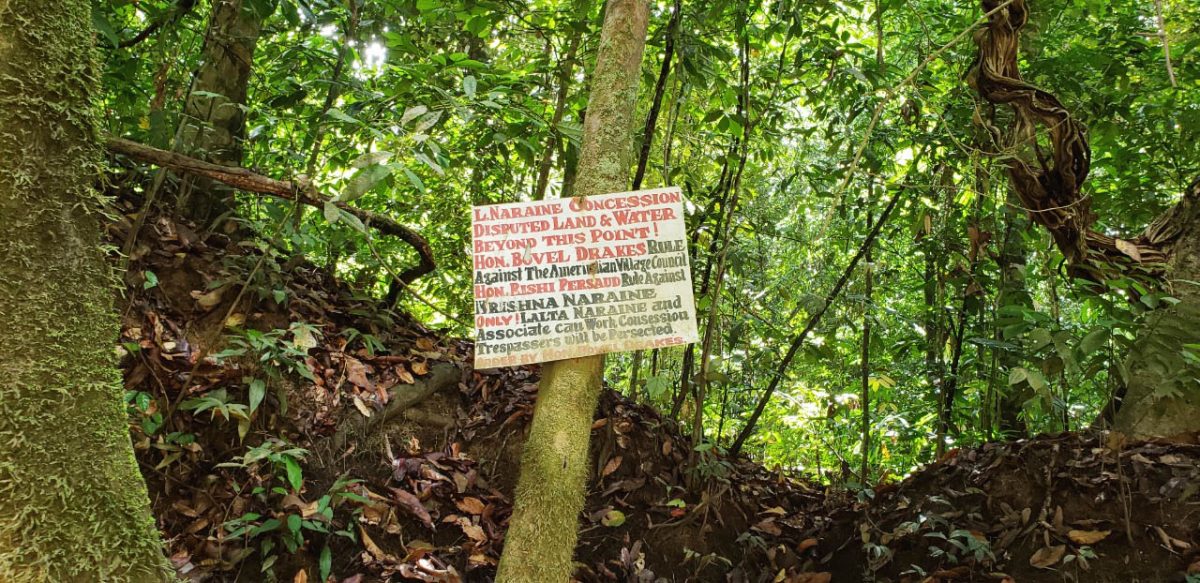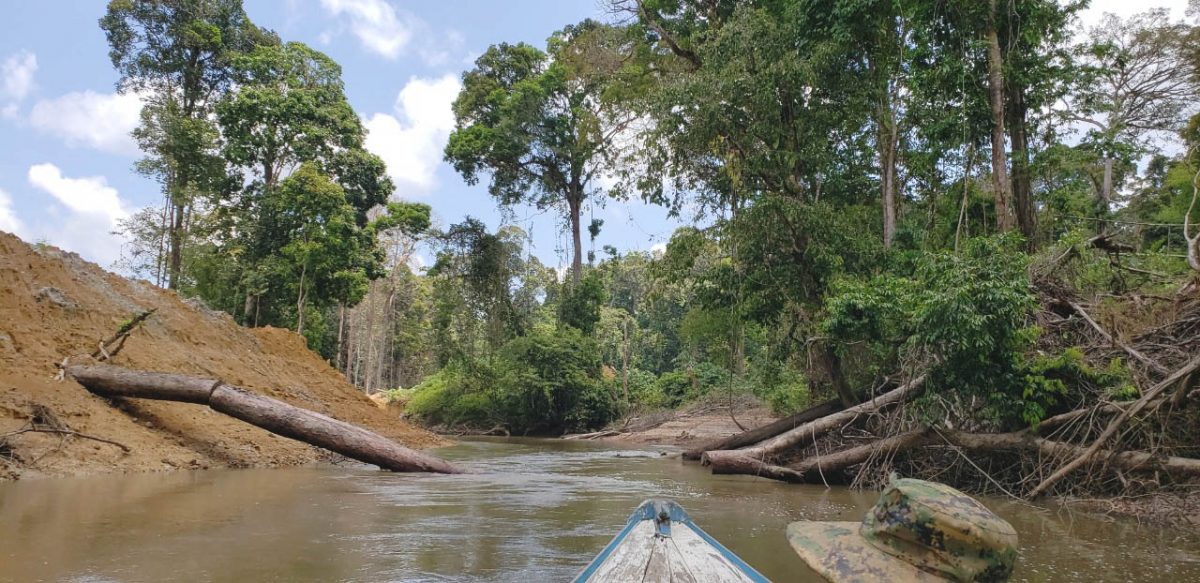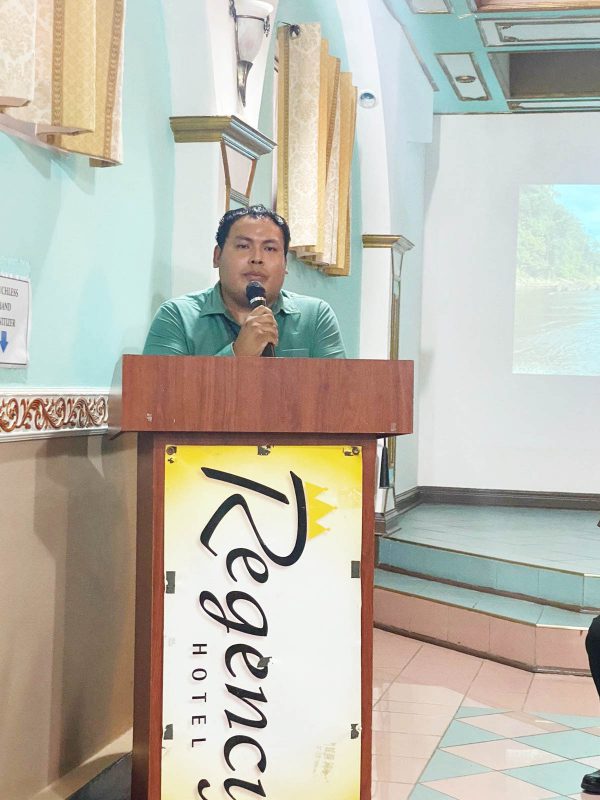Following the pronouncement of the Inter-American Commission on Human Rights (IACHR) that the Government of Guyana is guilty of violating the rights of Isseneru and its villagers, the community’s leader have said that the violations have intensified.
They are also hoping that the government is swift in its implementation of the IACHR’s recommendations, including, among other things, that the necessary measures be adopted to ensure that the village and its members receive “full reparations for the material and immaterial damages they suffered on the account of the violation of their human rights.”
Additionally, the IACHR advised government to “…amend its legislation in order to secure that the provisions of the relevant Acts and regulations related to indigenous territorial property are in harmony with the American Declaration, in accordance with international law according to the present merits report.”
The IACHR recommended that the government employ the necessary measures to support Isseneru and its members in their duty to preserve and protect the environment, particularly in relation to the mining operations that the community undertake on its ancestral lands.
Yesterday, a group of leaders – past and present – held a press conference at Regency Suites, Hadfield Street, Georgetown, where they welcomed the decision of the Commission and called on the government to implement the recommendations.
Toshao Dhaness Larson described the IACHR’s decision as landmark. He said, “…it [the decision] vindicates the complaints we have made regarding the government’s failure to adequately recognize, respect and protect our rights as indigenous peoples by failing to issue title to the full extent of our customary lands and by allowing mining activity to take place on our ancestral lands, even our titled lands, with no prior consultations or consent.”
Reading from a prepared statement, Larson added that the community has felt and continues to feel the impacts of mining pointing out that their waterways have been polluted, the natural environment degraded and livelihoods diminished.
“…We will not be satisfied until significant steps are taken by the government to address the blatant and now validated violations of our rights and the rights of other indigenous peoples across Guyana who are faced with similar situations. The Inter-American Commission decision makes clear that there is a lack of legal protection for indigenous people’s rights in our country, that our judicial remedies for rights violations are deficient and that the government’s actions have been racially discriminatory against indigenous peoples and it called on the government to correct its course,” the toshao said.
Isseneru, an indigenous community consisting largely of people from the Akawaio nation, and the Amerindian Peoples Association (APA) approached the IACHR on September 5, 2013, arguing that the government had violated the rights of the community and its members to property, equality before the law, justice and a fair trial, to the protection of mothers and children, to the preservation of health and wellbeing, and to enjoy the benefits of culture. All of these rights were protected by several Articles of the America Declaration on the Rights and Duties of Man.
IACHR, in its December 2021 report, informed both parties that the state is responsible for at least 16 violations of the rights of the Isseneru community and its members. Among others, the IACHR identified that the Amerindian Act of 2006 failed to recognize the pre-existence of indigenous territorial rights, and did not obligate the state to grant indigenous communities title to ancestral territory.
The IACHR report informed that the state failed to grant Isseneru title over its entire ancestral territory despite the community demonstrating that it is a primarily Akawaio village, that it is set within Akawaio territory and, among others, it needs the full extent of the territory to pursue livelihood and survival. Additionally, it further concluded that the community’s rights to health, water, food and a healthy environment were violated by the negative impacts of mining in the community particularly contamination of waterways.
IACHR has given the government two months to “comply with the Commission’s recommendations and resolve the situation.”
At yesterday’s press conference, Larson said that the Village Council is yet to meet with the community and discuss the reports as well as make decisions on the way forward. The community, after meeting and discussing the issue, intends to engage with the relevant agencies on arriving at mutually agreeable solutions.
“The government would have already received this document. So we are looking forward to possible engagements with them to pave the way forward to what some remedies can be towards our situation…we look forward to talking this with the government to see how best our issues can be resolved and we can be able to move forward because that is something that has been holding back us in this regards,” former Secretary of the Isseneru Village Council Dwight Larson said.
He added that the Amerindian Act outlines the processes to be employed when addressing issues as important as this one and they are hoping to have that general meeting very soon.
25% of titled lands
The appeal to the IACHR partly stemmed from two High Court rulings against the village’s objections to mining projects. Back in 2013, Justice Diana Insanally made orders granted to miner Joan Chang against the Isseneru Village Council and the Guyana Geology and Mines Commission (GGMC) binding. Members of the Village Council had claimed that the mining company was mining on titled lands without the council’s permission under the Amerindian Act and despite subsequent Cease Work Orders (CWOs) issued by the GGMC mining officer. Justice Insanally pointed out in her ruling that by virtue of Chang being granted a licence to mine prior to the coming into operation of the Amerindian Act of 2006, the Village Council had no authority to stop the operation and the GGMC no authority to issue the CWOs.
On August 13, 2008, a similar judgment was made in the High Court in the case of Lalta Naraine v Isseneru. The case of Naraine has been appealed and is languishing at the Court of Appeal since 2008/2009 according to the villagers.
At yesterday’s press conference, Dwight Larson related that 25% of the Isseneru’s titled lands are being mined by Naraine. He added that there are over 100 mining concessions within Isseneru’s titled and ancestral lands.
“It is even more unfortunate that nine years after we filed this petition, our ancestral lands continue to be damaged by continuing mining in concessions held by Lalta Naraine, Joan Chang and others. The village again calls on the government to stop this highly destructive mining that is now proven to violate the rights of our people,” the village’s prepared statement explained.
Dwight Larson added that the case before the Court of Appeal cannot proceed since the High Court judgment was never written and handed over to the parties. The judge is now off the bench.
“As we are aware our case is still at the Court of Appeal. It is languishing there for many years now. One of the reasons why we have filed this petition because some of these cases could not have been remedied at the local level. That is the most important [reason] why we had taken steps out of the country to see where we can get justice on these land matters.
“Besides the Naraine case, we have pending cases with other third parties and those have not been resolved as yet. All are somewhere within the system. The judge has not produced a written judgment in this regard [Naraine’s appeal] so there is that challenge there for us to know what is happening in this case,” he explained.
The IACHR also said that Article XXIII of the America Declaration on the Rights and Duties of Man, which states “Every person has a right to own such private property as meets the essential needs of decent living and helps to maintain the dignity of the individual and of the home,” was further violated when the Amerindian Act conferred the Minister of Amerindian Affairs an “overboard and excessive degree of discretionary powers on whether to grant property title to indigenous communities…”
It concluded that the community’s right to equality before the law was violated and the title deeds granted along with the judgments of the court placed private property rights and economic interests of third parties over the protection of indigenous territorial property.
The report said the state violated “…the right to indigenous collective territorial property of the Isseneru community and its members because the mining operations developed by Messrs. Lalta Naraine and Joan Chang were not the subject of prior consultations, socio-environmental impact assessments, or reasonable benefit-sharing mechanisms before they began implementation.
“The right to collective territorial property, and its interconnected rights to health, food, water, a healthy environment and cultural integrity, because in relation to the untitled lands -within Isseneru’s ancestral territory the State has granted mining permits which have not been consulted, assessed in their environmental and social impacts, nor been the matter of reasonable benefit sharing.”
The IACHR highlighted that, if any permits, concessions or licenses are issued for mining, forestry or any other extractive activity within the untitled parts of Isseneru’s ancestral territory before said territory is duly titled, demarcated and delimited in its full extent, the State of Guyana would incur in a violation of international law, in particular of the right to collective property under Article XXIII of the American Declaration.
Meanwhile, Dwight Larson told reporters that the IACHR ruling has shed much-needed light on the deficiencies in the laws to protect indigenous peoples.
“We are happy that our ruling can shed a light as it relates to the many violations that Isseneru has faced. It has also revealed the many of the deficiencies in our laws to protect our indigenous peoples and I must say that we are happy to be on this side today to say that we have received a ruling from the Inter-American Human Rights Commission to say that we were right all along, to say that our rights as indigenous peoples has been violated.
“If we go back to our Amerindian Act we can see that there are many shortcomings that do not protect the rights of indigenous peoples in our country and Isseneru is not the only community that has been affected by it. We have so many communities that is facing these same problems,” he highlighted while calling for the Amerindian Act of 2006 to be amended.
…no discussions yet
Yesterday, Vice President Bharrat Jagdeo was asked about the report and the government’s intention on the implementation of the recommendations by the IACHR.
He said “…I’ve not examined the issue so I don’t want to venture and comment on that as yet…I have not examined the issues or that has not been discussed at the level of the government to take a definitive position.”
He explained that while the PPP/C was in opposition, it had argued that the Amerindian Act was a significant advancement on previous legislation and opposed the then APNU+AFC’s moves to begin the amendment on grounds that it retrenched on some of the existing rights.
“We said we would support the APNU if any of the amendments would enhance the rights of the Amerindian people or bring greater benefits for them. But we are not going to undermine any existing benefits. Our position remains the same in a broad sense because, our indigenous people, we got to leave room for them to grow and enjoy special protections but at the same time we live in a unified country, so whatever we do in one area has repercussions in other areas,” he said.
Amendments to the existing Amerindian Act is something that indigenous rights groups continue to call for, noting that it does not guarantee them adequate protection and access.
Jagdeo, who was President at the time of the passage of the existing Amerindian Act, said that was envisioned encompassed four core principles; namely, granting of community governance, subsurface rights, the creation of the Indigenous Peoples Commission, and providing a pathway for resolving land issues.










